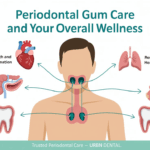People often wonder what the difference is between dental crowns and dental fillings. They also wonder which among them is a highly recommended choice. When tooth restoration is required, different types of dental procedures can be applied to restore both the appearance and the function of the teeth. Some of these options include dental filling, dental crown, veneer, dental implant, bonding, and dental bridges. Several factors determine the type of teeth restoration process that will be best for each patient. Some of these factors include the budget, severity of the tooth decay, a result that is desired or expected, and the overall health of the patient. You should consult your dentist near me so that the appropriate treatment method would be recommended for your dental ailment.
Dental fillings are not as expensive as dental crowns so if your budget is limited, you might want to go for it. However, if your dental issue is a complicated one, and you are desirous of something that would last a long time, then you should probably stick with dental crowns although it is a bit expensive.
Things to consider
- The severity of the tooth problem
The first thing you and your doctor should consider is how serious the dental issue is. For instance, minor dental damage requires dental fillings, while major one will need a crown.
- Budget
The budget may also determine the treatment one is going to get. In case you are working on a budget dental fillings may be the right treatment because is less expensive. However, if your dental issue is complicated, and you are looking for something long-lasting, then a dental crown will be a highly recommended option even though it is a bit expensive.
- Desired results
What is your preference? If your dental appearance is a key concern, you will have to go for a treatment that matches the shade or color of your teeth. For instance, when it comes to dental crowns the dentist can help design the kind of crown that looks natural or matches with the existing teeth.
- Others
- Root canal procedure
- The amount of tooth structure left
- Your dental history
Dental Crown
Dental crowns are also referred to as dental caps and are used in the restoration of a severely damaged tooth in cases such as a broken tooth or serious tooth decay. A crown is produced usually with ceramic or porcelain, and it is customized to be a perfect fit on the affected tooth. Dental crown installations can restore full tooth functionality and appearance and also serve as protection for the teeth. They can also be used to provide support for large fillings and weak teeth.
Crowns are usually supported with bridges or implants to provide stability. They are cemented and fixed permanently to the teeth, so they can’t be removed. Crowns are also aesthetic and can match the shade of your natural teeth, especially porcelain or ceramic crowns. They are highly attractive. Installation of dental crowns can make our teeth look and function naturally for a very long time. At URBN Dental clinic Houston, we offer affordable dental crowns in Houston and can help with crown installations.
- Reasons to consider dental crowns
Your emergency dentist may recommend a dental crown for many reasons such as to attach a bridge, cover the implant, protect week tooth from fractures, cover the discolored tooth, cover a tooth after a root canal treatment, cover the poorly shaped tooth, restore a fractured tooth, and so on.
- Weak tooth protection
- Broken tooth restoration
- Cover and support tooth with a large filling
- Hold a dental bridge
- Cover implant
- Cosmetic reasons
Dental Filling
A dental filling is required to treat minor tooth issues, such as minor tooth damage caused by decay or maybe a crack in the tooth. This tooth restoration method also restores the shape and full functions of the damaged tooth. In the course of treatment, the tooth is first prepared by the dentist by taking out the decayed part of the tooth and also cleaning the affected area. The filling material is then fixed for the restoration of the tooth structure. The filling is helpful in the prevention of further tooth decay and also stops the invasion of bacteria. Dental fillings just like crowns can be made from different materials. Materials such as gold, metal amalgam, porcelain, or composite resins are tooth-colored.
- Amalgam fillings
Even though amalgam fillings are less expensive if appearance is the key concern they are not the right option. Amalgams are less appealing due to their dark work. They are quite noticeable and should be fixed on less visible teeth like back teeth.
- Gold fillings
There are several reasons you should consider gold fillings like the fact that they are durable, the gum tissues can tolerate them, among others. The major drawback that comes with this type of fillings is that they are very expensive.
- Composite resins
If you are looking for a natural appearance, then these fillings are a highly recommended option. Composite resins are designed with a shade or color similar to your existing teeth. However, they are many drawbacks that come with these filings; they crack or chip very easily, wear and tear within a short period, are easily stained by tea, coffee, or tobacco, and others.
- Porcelain fillings
The good thing about these kinds of fillings is that they tend to match with the teeth’ color, and can resist stains from coffee, tobacco, and other substances. Not every type of dental filling can be perfect for everyone. Several things can determine the highly recommended dental filling you; extent of tooth repair, if you are allergic to certain materials, the cost, and the position the dental filling will be fixed.
- Reasons to consider dental filling
- To treat minor tooth damage
- To treat minor dental decay
- To restore a fractured tooth
- To restore a discolored tooth
- To restore tooth structure
Other Tooth Restoration Procedures
- Dental Implants
Dental implants help the dentist fix replacement teeth! They are in form of metal posts or frames and are positioned into the jawbone via surgery. The fact that they are positioned into the jawbone helps to provide the stability the artificial teeth need. Dentures, bridges, and crowns can be mounted onto the implants to provide the stability or strength need when eating or speaking. Supporting the replacement teeth will ensure the teeth do not slip, shift or fall off when chewing. Also with the dentures or bridges, well-fitted one feels like the replacement are real teeth, and looks more natural than having conventional dentures or bridges.
For the implant treatment to work, you need to have adequate bone and healthy gums for support. For dental implants to be successful in the end, you need to visit your dentist regularly and maintain oral hygiene. Although dental implants are more expensive, they provide highly recommended support for replacement teeth.
How it is done? There are some things the dentist should consider before dental implant surgery; the condition of your jawbone, the type of the jawbone, and others. The implants titanium fuse with jawbone! The implants surgery can be performed only if;
- One or more teeth are missing
- The oral tissues are healthy
- You have no serious health conditions that will interfere with bone healing
- You feel uncomfortable wearing conventional dentures or bridges
- You would like to improve your speech
- You are disciplined enough to commit several months to the healing process
- Your jawbone is adequate to secure the implants
- Your jawbone has reached full growth
- Dental Bridges
Sometimes missing teeth may create gaps, and dental bridge fix that gaps. Bridges help to restore tooth functions such as smiling, chewing, and speaking, as well as enhancing appearance. Traditional bridges are the most common! They consist of one or more fake teeth (pontics). Dental crowns usually hold fake teeth! Other types of bridges include;
- Traditional bridges
- Maryland bonded bridges
- Implant-supported bridges
- Cantilever bridges
With regular visits to the dentist and good dental hygiene, bridges can last for more than 5 years. Bridges are known to have a lifespan of 5 to 15 years. While bridges can last longer, with time they may fall out. Thus, you need to practice good oral hygiene to ensure the bridges last longer; brush twice a day with fluoride toothpaste, attend follow-up visits to the dentist, avoid chewing hard objects like ice, among other oral care tips.
Determining the right treatment
Although all the above restoration procedures are used to restore oral health, repair tooth damage, and prevent further tooth damage, the highly recommended treatment will depend on the patient’s needs and desired results. For instance, major tooth damage or decay is best treated with dental crowns, while dental fillings can work better on minor tooth damage or decay.
In case of any form of tooth damage like tooth decay, you should seek immediate treatment at URBN Dental Midtown or Uptown to avoid serious complications. If you suffer from tooth decay, dental cavities, tooth fracture, and other dental problems, you should contact your dentist office near me to discover your treatment options.
Final Verdict
Tooth decay and dental fractures should be treated as soon as possible to avoid serious dental complications like tooth loss in the future. Fortunately, dental restoration procedures such as the dental crown, dental implant, dental fillings, and dental bridges can help treat such cases. Although there are several solutions for restoring tooth structure, functions, and strength, dental fillings and dental crowns are the most common and effective too.
While dental crowns are a highly recommended solution for treating severely damaged teeth, dental fillings can help treat cavities caused by tooth decay. Your dentist will examine the dental problem and recommend highly recommended treatment for you. Some cases of dental pain can be eliminated through dental restoration procedures. Nothing causes painful teeth like a broken tooth, damaged teeth, dental decay, or cavity, and most of these cases can be treated via dental restoration procedures like tooth filling and dental crown.















